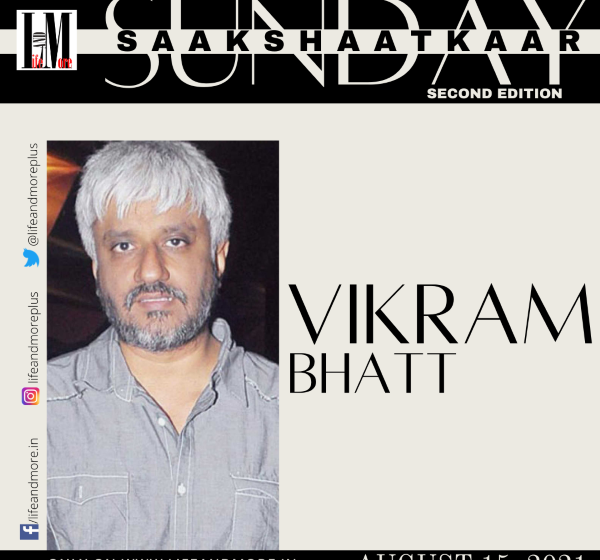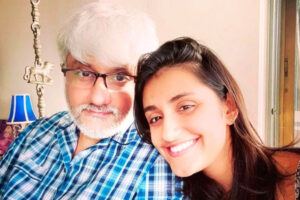Horror as a genre excites me

He started his career with filmmaker Mukul Anand at 14 and was his chief assistant director on the sets of Agneepath. After working with filmmaker Shekhar Kapur, he worked with Mahesh Bhatt before he turned director with Jaanam. And followed it up with Ghulam, Kasoor, Raaz and Awaara Paagal Deewana.
In an exclusive interview with SUKRITI TANKHA, producer-director-scriptwriter VIKRAM BHATT talks about The Audio Film Project on 93.5 RED FM here he narrates high intensity horror and thriller stories on air to give listeners a never-before experience in the form of audio films, choosing horror and thrillers to make movies, his daughter Krishna, his life and more…
Was it your idea or did RED FM approach you with this concept?
It is a very interesting story. When you write horror, it’s very difficult to make people see what you are ideating and you cannot put it across on page. So to make my team understand, I started audio recording the horror sequence instead of giving written scripts. I realised that made a better impact and they understood the scripts. It was like narrating a ghost story. It was during the lockdown that I created a capsule with sounds and effects and shared it with my team. It had a different impact and that’s when I realised that this can be a gamechanger in the audio space. I figured that this can be a different way to reach out to audience. I contacted RED FM and shared this audio clip and they found the idea to be very potent. From there, it has been a rollercoaster ride with two months from inception to being on air.
How challenging is it for a seasoned and experienced filmmaker, who has always expressed himself visually, to shift to one where the visual medium is completely missing?
There is a very nice saying in the writer’s community, ‘The filmmaker sees the film first in their mind’ so I cannot write unless I see the film in my mind. The thought that if I can see an imagery in my mind, why cannot I make people see that in theirs through audio narration. I am helping people see the film in their minds without asking them to be a filmmaker. There was a time when we used to narrate stories to the actors and there was no concept of written scripts. We had to be good at the art of narration and to make actors believe in the idea and make them see the films in their minds. I believe all that training has come to use finally with The Audio Film Project.
Are these stories penned by different writers or are these penned by you?
All the story ideas are mine. Shweta Bothra, my co-writer, who also writes screenplays, helps me with the stories. Once the idea is in place, she and I flesh it out together.
What changes did you have to introduce in your style of expression to be a part of The Audio Film Project?
The Audio Film Project is a narrative structure and they say a picture is worth a thousand words. As a film director, I give a picture, I have given you a description of thousand words and now it’s the other way around. Now we have words and don’t have pictures, but through words we have to create a picture. I try and use as few words as possible and leave the rest to audience’s imagination. The audience has a very vivid imagination. The power of human mind is unmatched, it constructs vivid pictures based on very few words. The challenge has been to work on that art. One is not as good at it at the moment as I would like to be, but I hope to get there.
Your daughter Krishna has assisted you in this project. Tell us more about this third generation talent from the Bhatt khandaan.
Krishna is exciting to work with and she has directed the show along with me. She does sound scaping and music after I record the show. She is a pianist and has a brilliant sense of music. Not because she is my daughter but honestly I was convinced about her skills and what she will bring to the table. That’s what made me collaborate with her. This project fits her well and space of audio and storytelling is up her alley.
What was that one thing which made Vikram Bhatt choose horror and thriller as genres to make films?
It is a genre that excites me. Not just films on horror and thriller, I would love to make sci-fi films too. I don’t think we have an audience that understand that genre. People go to theatres for entertainment and we are more of a culture of mythology than sci-fi.
Share your earliest memories of listening to radio programmes.
I remember back in my school days, there was no FM. Every Thursday, there used to be Top of The pop on BBC, if I recall correctly. That used to be short wave radio and it was very difficult to catch. A friend and I used to climb up the terrace of our building and we’d pick a wire from the antennae of a radio and attach it to the antennae of the TV. We used to listen to ‘Top of The Pops’ from UK and we would also record the songs in a cassette. It used to have terrible recording of our favourite songs but we were really excited to hear them. Also, listening to the Wimbledon used to be on radio back in those days. The finals used to be broadcasted on radio and I remember listening to it.
How challenging is it to pen characters which audiences connect and relate with? And now how challenging is it to visualise characters which listeners connect and relate with?
It’s not challenging at all to make relatable characters. I think it’s more challenging to make fantastical characters like superheroes with emotions. It’s difficult to give these larger than life characters emotions. When it comes to creating real characters, unless you are not in touch with reality, people, and surroundings at all it gets difficult. When I am writing these days, I have included the pandemic situation in my stories because one can’t pretend it never happened. It has changed our lives forever in many ways. To consider that the pandemic doesn’t exist is a big mistake. As long as you have your ear to the ground, and as long as your hearts beats along with others around you, I don’t think it is ever a challenge.
You have worked with some of the biggest names of the film industry. What have been the learnings during this period which you have implemented in professional and personal life?
It has taught me that the bigger the film, the greater the false sense or certainty that it will work. I have understood that budgets don’t work, stars don’t work, locations don’t work, and photography doesn’t work. What really works is story. It is always the writing that works. Now people more than ever want to watch good content. If they are not enthralled by the story that they are going to watch then they have a lot of other avenues. All this my career has taught me, whenever I have made a film to make money it has flopped. Whenever I have made a film to tell a story, it has succeeded.
Your favourite movies, directors.
Fav movie- Amadeus (internationally). Mozart’s life story
Indian film- Saaransh by my boss, Mahesh Bhatt
I don’t have any favourite director, but I have many favourite work by directors. I love Shakti, Sholay , Trishool, Deewar and Kabhie Kabhi. From my boss, Mr Mahesh Bhatt, Saaransh, Sir, Zakhm are some of the gems that I admire. Currently, my favourite director is Sanjay Leela Bhansali. He takes so much pain to make his films, he is an artiste and understands cinema in a really well rounded way.
Most promising filmmakers to look forward to.
In times to come, the definition of directors is going to change because there’s going to be OTT and micro web series that is going to change the dynamics of filmmaking. Hansal Mehta directed Scam 1992 along with Raj and DK who did Family Man did much better in series format shows than films. Both their works were commendable.




